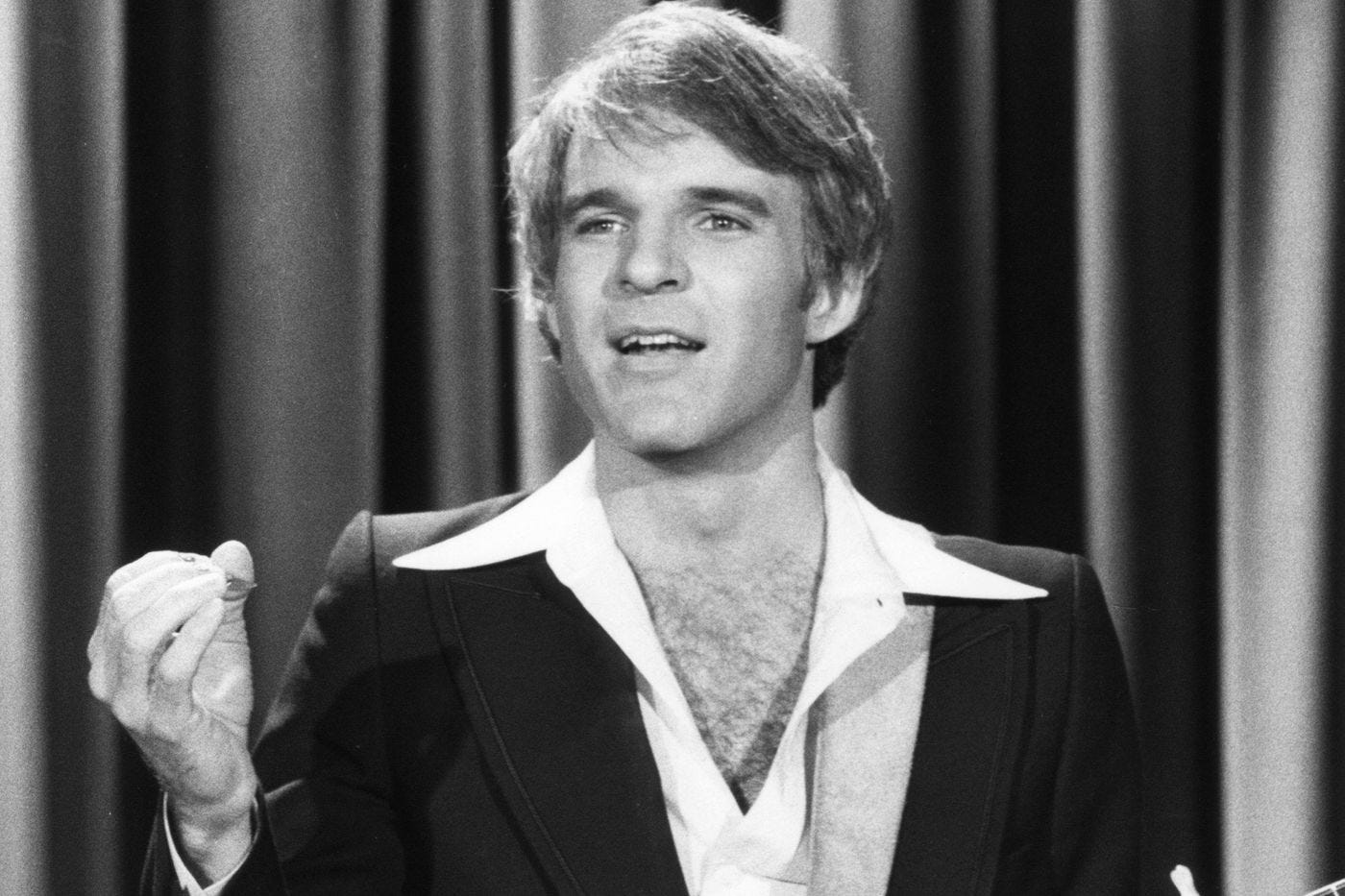What Stand-Up Taught Steve Martin About Writing
Dear Everybody,
25 years after he quit stand-up comedy forever, Steve Martin looked back on that “crucial part” of his professional life.

“I did stand up comedy for eighteen years,” he wrote in his memoir, Born Standing Up. “Ten of those years were spent learning, four years were spent refining, and four were spent in wild success.”
Reflecting on the early years, Steve alluded to what he learned as a writer and comedian. He wrote:
I was also enamored of the rhythmic poetry of e.e. cummings, and a tantalizing quote from one of his recorded lectures stayed in my head. When asked why he became a poet, he said, “Like the burlesque comedian, I am abnormally fond of that precision which creates movement.” The line, with its intriguing reference to comedy, was enigmatic, and it took me ten years to work out its meaning.
“What was hard,” he wrote, “was to be good, consistently good, night after night, no matter what the abominable circumstances … but as I continued to work, my material grew…
My show was becoming something else, something free and unpredictable, and the doing of it thrilled me, because each new performance brought my view of comedy into sharper focus.
The act tightened. It became more physical … [and] the new physicality brought an unexpected element into the act: precision. My routines wove the verbal with the physical and I found pleasure trying to bring them in line …
Finally I understood the cummings quote I had puzzled over in college … [He repeats the quote, ending “I am abnormally fond of that precision which creates movement.”] Precision was moving the plot forward, was filling every moment with content, and keeping the audience engaged.
What Steve learned after a decade on the road is true of all writing:
The first form of precision is intellectual (i.e. leaving an intended message);
The second, higher form of precision is emotional (i.e. reaching the human heart); and
The third, highest form of precision is physical (i.e. moving the plot forward).
Writing brings ideas and emotions in line, and it moves: it takes the reader from from one thought to the next, in sequence and at the right pace, never achieving one form of precision at the expense of another.

Learning About Movement (and Stillness) Through Magic
In retrospect, Steve had been absorbing these lessons from a young age. At fifteen, he began his show business career at a magic shop, standing “behind a counter eight hours a day, shuffling Svengali decks.” He was dazzled by the secret mechanics of tricks, and through magic he was learning a great performance isn’t about showing things, but hiding them:
[Steve’s mentor, the magician Leo Behnke] handled cards with delicacy; there was a rhythm to his movements that was mildly hypnotic. He could shuffle the deck without ever lifting it from the tabletop: after an almost invisible riffle, every card was interlaced exactly with the next, a perfect shuffle…
A magician’s hand are often hiding things, and I learned that stillness can be as deceptive as motion. It was my first experience with the pleasure and subtlety of physical expression, and I became aware of of the potency of movement.
Writers too are aware of the potency of movement (and stillness). Like a magician shuffling cards or a pickpocket lifting a wallet, there’s a rhythm and purpose to every action:
Each movement dovetails perfectly with the next, with no extraneous steps or flourishes. When [Apollo Robbins, the world’s greatest pickpocket] places his arm somewhere, it’s not an accident; he’s blocking his victim’s view or locking him in place or temporarily stashing a wallet by pinning it against its owner’s body.
-Adam Green, “A Pickpocket’s Tale: the Spectacular Thefts of Apollo Robbins”
The top one percent of writers play with ideas; the top 0.1 percent toy with emotions; and the top 0.01 percent write symphonies — they move the plot forward with every word.
(Dynamic changes in Ludwig van Beethoven’s Symphony No. 1, 3rd Movement, Menuetto)
Leave a comment and Follow me on Twitter
Sincerely,
Justin


